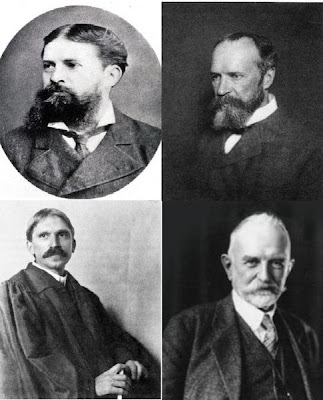Thursday, April 14, 2011
Americans, Wittgenstein, Russell...
PW 108-119
1. What school of philosophy thrived in St. Louis in the 19th century? What is the sensibility of traditional ("classic") American philosophy?
2. Which Puritan minister echoed John Calvin's view that all humans are born depraved and deserving of eternal punishment?
3. Which American revolutionaries do our authors name as "philosophically talented thinkers"? What has been the "routine" stance of the American public towards philosophy?
4. Which American "anarchist" inspired Gandhi and King? Which American follower of Kant and Hegel promoted humanism and self-reliance and considered nature inherently spiritual?
5. How did the new American philosophy distinguish itself from the European tradition? What was its unique style? What was it called?
6. Which logician rejected "eternal" and "a priori" beliefs as practically useless, and spurned the label "pragmatist" when he was credited with being the movement's founder?
7. Who was the "radical empiricist" and pluralist who said religious beliefs may be justified if they help us navigate our experience and make sense of our lives? What is "pluralism" in philosophy? How does it reflect the American experience?
8. Who began as an "evangelical" Hegelian, rejected reductionism and dualism in philosophy, and insisted that children learn best by doing?
9. Which Harvard student of James's defended "black pride"?
10. Which German philosopher most influenced "the linguistic turn"? Which English philosopher was not content merely to memorize the arithmetic tables but wanted to show that they could be derived from logic? Who was his collaborator in this endeavor? To what kind of "atoms" did he try to reduce the world's complexity? What other kind of philosophy was he known for?
11. Which German philosopher founded a new approach to the study of consciousness that attempted to describe its essential structures? What did he mean by "intentional"?
12. Which student of Russell's proposed a "picture" theory of meaning and emphasized the "unsayable"? Why did he leave philosophy? What did he say when he came back?
13. What were Freud's pro- and anti-Enlightenment ideas? Why were his ideas considered outrageous?
14. What did Max Weber say about Calvinism?
1. What school of philosophy thrived in St. Louis in the 19th century? What is the sensibility of traditional ("classic") American philosophy?
2. Which Puritan minister echoed John Calvin's view that all humans are born depraved and deserving of eternal punishment?
3. Which American revolutionaries do our authors name as "philosophically talented thinkers"? What has been the "routine" stance of the American public towards philosophy?
4. Which American "anarchist" inspired Gandhi and King? Which American follower of Kant and Hegel promoted humanism and self-reliance and considered nature inherently spiritual?
5. How did the new American philosophy distinguish itself from the European tradition? What was its unique style? What was it called?
6. Which logician rejected "eternal" and "a priori" beliefs as practically useless, and spurned the label "pragmatist" when he was credited with being the movement's founder?
7. Who was the "radical empiricist" and pluralist who said religious beliefs may be justified if they help us navigate our experience and make sense of our lives? What is "pluralism" in philosophy? How does it reflect the American experience?
8. Who began as an "evangelical" Hegelian, rejected reductionism and dualism in philosophy, and insisted that children learn best by doing?
9. Which Harvard student of James's defended "black pride"?
10. Which German philosopher most influenced "the linguistic turn"? Which English philosopher was not content merely to memorize the arithmetic tables but wanted to show that they could be derived from logic? Who was his collaborator in this endeavor? To what kind of "atoms" did he try to reduce the world's complexity? What other kind of philosophy was he known for?
11. Which German philosopher founded a new approach to the study of consciousness that attempted to describe its essential structures? What did he mean by "intentional"?
12. Which student of Russell's proposed a "picture" theory of meaning and emphasized the "unsayable"? Why did he leave philosophy? What did he say when he came back?
13. What were Freud's pro- and anti-Enlightenment ideas? Why were his ideas considered outrageous?
14. What did Max Weber say about Calvinism?
Subscribe to:
Post Comments (Atom)












 Charles Darwin (
Charles Darwin (















No comments:
Post a Comment